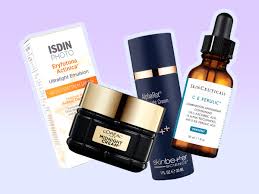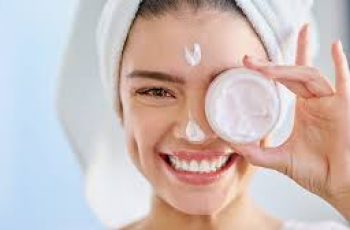
Anti-Aging Skincare Products You Should Have in Your Routine, According to Dermatologists
As you age, it’s common to start noticing differences in your skin–from fine lines and wrinkles to thinning and dryness. The natural aging process causes skin to lose collagen and elasticity, while lifestyle factors like smoking, sun exposure, and insomnia can also take a toll.1
To protect your skin as you get older, it can help to develop an anti-aging skincare routine. Three dermatologists spoke to Health about the skincare products you can incorporate into your daily routine to keep your skin looking plump and firm for longer.
Sunscreen
The first step in fighting visible signs of aging is using sunscreen–even if you’re not headed to the beach for the day. Sunscreen protects your skin from the harmful effects of ultraviolet (UV) light from the sun’s rays. This powerful layer of protection reduces your risk of sunburn and even certain cancers.
Research suggests that applying sunscreen on a consistent basis can help prevent:
Skin cancer
Melasma (dark spots)
Sunburn
“Age spots”
Leathery skin
Wrinkles2
“Sun damage is one of the biggest causes of premature aging,” Thomas Griffin, MD, a board-certified dermatologist who serves as the Department Chair of the Laser and Aesthetics Surgery Center at Dermatology Associates of Plymouth Meeting, told Health. “UV radiation breaks down collagen and elastin, which leads to wrinkles, freckles, and other pigmentation.”
Ingredients to Look For in Sunscreen
With so many options, it can be difficult to know which sunscreen is best for you. However, there are some universal tips that work for all. According to the American Academy of Dermatology, you should opt for sunscreen that offers:
Water resistance
Broad-spectrum protection (protection against both UVA and UVB rays)
SPF 30 or more3
“Additionally, mineral sunscreens [also known was physical sunscreens] containing zinc oxide and titanium oxide are best because they work as a reflector shield to block the full spectrum of UV light,” added Griffin. Mineral-based sunscreens also tend to be less irritating to people with sensitive or acne-prone skin, as well as people with rosacea, because they don’t absorb into your skin.
Retinoids
When it comes to evidence-backed anti-aging skincare products, few can rival retinoids. Retinoids are vitamin A derivatives found in many prescription and over-the-counter (OTC) skincare products, such as topical creams, moisturizers, and serums.4There have been about 50 years of research on the anti-aging properties of retinoids, according to Elaine F. Kung, a board-certified dermatologist based in New York City and founder of Future Bright Dermatology.
“[Retinoids] are among the most effective substances [that can slow] down the aging process,” Kung told Health. “Anti-wrinkle properties of retinoids include: strengthening the protective function of the epidermis [the outer layer of your skin], improving transepidermal water loss, and protecting collagen from degradation while stimulating collagen production … Moreover, retinoids reduce discoloration of the skin by about 60%.”
Common examples of retinoids include adapalene, tretinoin, and retinol. Some are more commonly used to treat acne, while others–such as retinol, which is just a weaker form or retinoid–are often used to improve skin tone and texture.4
Ingredients to Look For in Retinoids
There are many skincare products that contain vitamin A derivatives, from night creams and eye creams, to serums and more. However, these ingredients can show up under many different names. “Vitamin A derivatives can be denoted as vitamin A, retinol, retinyl acetate, retinyl palmitate, and retinaldehyde,” said Kung.
While retinoids can be an anti-aging game-changer, there are some potential side effects to be aware of. During the first few weeks of using a retinoid, some people experience a side effect called “retinol burn,” which involves burning, itching, flaking, and redness.5
To use retinoids effectively while avoiding skin irritation as much as possible, Kung suggests that you control the amount and frequency of retinol use. “I suggest one drop (pea-size) over the face, once to twice a week to start. If there’s no irritation or rashes, increase the frequency of use by one day per week. If there is irritation, instead of abandoning the retinol, go back to using it less frequently,” said Kung.
If you’ve never used a retinol before, Kung recommends limiting your skin’s exposure to it as much as you can. “Apply the retinol product for 15 to 30 minutes, and then wash it off instead of leaving it on overnight,” she said.
Vitamin C
Another ingredient that shows up in a wide variety of anti-aging skincare products is vitamin C. “Vitamin C is a powerful antioxidant which helps [prevent] the effects of damaging free radicals from UV light and air pollution,” said Griffin.
Free radicals are generated from normal biochemical reactions in the body and are also produced in response to environmental factors like sun exposure. These free radicals break cells down over time, which can lead to premature aging. Antioxidants help “disarm” these free radicals by neutralizing them before they cause damage to your DNA.
Vitamin C plays an important role in reducing oxidative stress. Oxidative stress involves an imbalance between the number of free radicals and antioxidants in your body. This stress shows up on your skin in the form of inflammation, slower wound healing, premature wrinkles, and more.6
In addition to fighting the effects of oxidative stress, vitamin C “brightens the skin and helps with pigmentary problems by being a tyrosinase inhibitor.” said Kung. This means it can prevent or reduce the appearance of the dark spots that tend to show up as you age.
Ingredients to Look For in Vitamin C
Many skincare products already contain vitamin C, especially creams, moisturizers, and sunscreens. It may be listed on the label as ascorbic acid, ascorbate, ascorbyl palmitate, magnesium ascorbyl phosphate, and ascorbyl glucoside, according to Kung. She also advises using products that contain a vitamin C concentration of at least 8%. “Reputable products of vitamin C serums available on the market are usually in the range of 10-20%,” added Kung.
Dermatologists also recommend opting for vitamin C skincare products that come in opaque packages like pumps or tubes. This is because some vitamin C formulas are very susceptible to oxidizing when exposed to light and air, which can make the serum less effective, and can also irritate your skin.
“Vitamin C can be irritating to your skin when you first start, so start with lower concentrations (like 10%) and work your way up,” said Griffin.
Hyaluronic Acid
As we age, our skin naturally begins to retain less moisture. Keeping the skin hydrated is key to smoothing out wrinkles and keeping skin looking as youthful as possible. That’s where hyaluronic acid comes in.
Hyaluronic acid is a highly effective hydrating ingredient that is often found in moisturizers and creams, both for the body and the face.7
“Hyaluronic acid is a naturally occurring substance in the skin that can hold up to 1000 times its weight in water,” Jake Woods, MD, a board-certified dermatologist at Gya Labs, told Health. It’s key to maintaining the elasticity that helps to prevent fine lines.
“As we age, our natural hyaluronic acid levels decrease, resulting in drier and less plump skin. By topically applying hyaluronic acid, it helps attract and retain moisture in the skin, providing hydration and giving a plumping effect, which reduces the appearance of fine lines and wrinkles,” added Woods.
Ingredients to Look For
When selecting a moisturizer or any other skincare product with hyaluronic acid, Woods suggests looking for either “hyaluronic acid” or “sodium hyaluronate” on the ingredient label.
In order to ensure the optimal level of skin hydration, Woods also recommends checking the molecular weight of the formula. In the world of skincare, molecular weight refers to the size of the product’s molecules. This determines how deep a given product can penetrate your skin.8
“Low molecular weight hyaluronic acid can penetrate deeper into the skin, while high molecular weight hyaluronic acid provides surface hydration,” Woods told Health. “A combination of both can be beneficial.”
Peptides
Peptides are tiny chains of amino acids that make up key proteins in the body and “act as messengers in the skin,” said Woods. Found in foods and supplements, they’re now popular in a variety of anti-aging products.
When used in skincare products, peptides work to increase the skin’s collagen levels, which decrease as you age. This helps to improve skin texture, fight inflammation, tighten the skin, lock in moisture, prevent sagging, and boost elasticity.9
“When applied topically, peptides can penetrate the skin and signal the production of more collagen and elastin,” Woods explained. “By increasing collagen levels, peptides help improve skin firmness, reduce the appearance of wrinkles, and promote a more youthful complexion.”
Ingredients to Look For
When looking for creams, moisturizers, and serums that contain peptides, you can look for ingredients like “palmitoyl pentapeptide-4 or copper peptides in the ingredient list,” said Woods. He suggests that you select products that contain multiple peptides, as they may address different aspects of skin aging.
According to Woods, concentration is another factor to consider when it comes to peptides. “Consider the position of peptides in the ingredient list,” he said. “The higher up they are, the higher the concentration in the product.” A higher concentration is typically a good sign of a higher-quality, more potent product.
Niacinamide
Niacinamide, or vitamin B3, is found naturally in many foods, like meat, fish, and eggs. It promotes healthy cell turnover, leaving the skin brighter and more hydrated.
Because of its anti-inflammatory, anti-microbial, and antioxidative effects, it’s also used in products that treat a wide range of skin conditions. In addition to aging skin, niacinamide has been used to treat:
Acne
Eczema
Psoriasis
Hyperpigmentation
Dermatitis
Certain skin cancers10
“Niacinamide enhances the production of ceramides, which are essential for maintaining a healthy skin barrier,” said Woods. “By improving the skin’s barrier function, niacinamide helps retain moisture and strengthens the skin’s protective layer.”
Ingredients to Look For
Niacinamide is sometimes listed simply as “vitamin B3” on product labels. Woods advises that it’s best to reach for skincare products with a niacinamide concentration of 2-5% for optimal effectiveness.
He also recommends selecting hybrid products in order to target multiple “problem areas” of aging skin at once. “Look for products formulated with niacinamide alongside other beneficial ingredients to enhance its effects,” Woods told Health.
A Quick Review
Skin naturally changes as you age, but there are steps you can take to keep it hydrated and protected through the years. Dermatologists recommend incorporating products such as sunscreen, retinoids, vitamin C, hyaluronic acid, peptides, and niacinamide into your anti-aging skincare routine.
Everyone is different, so every skincare routine should be as well. Some of the above products may not work for you if you have very sensitive skin, acne, or other skin conditions.
Talk to your dermatologist to tailor a skincare routine that is tailored to your unique needs.


